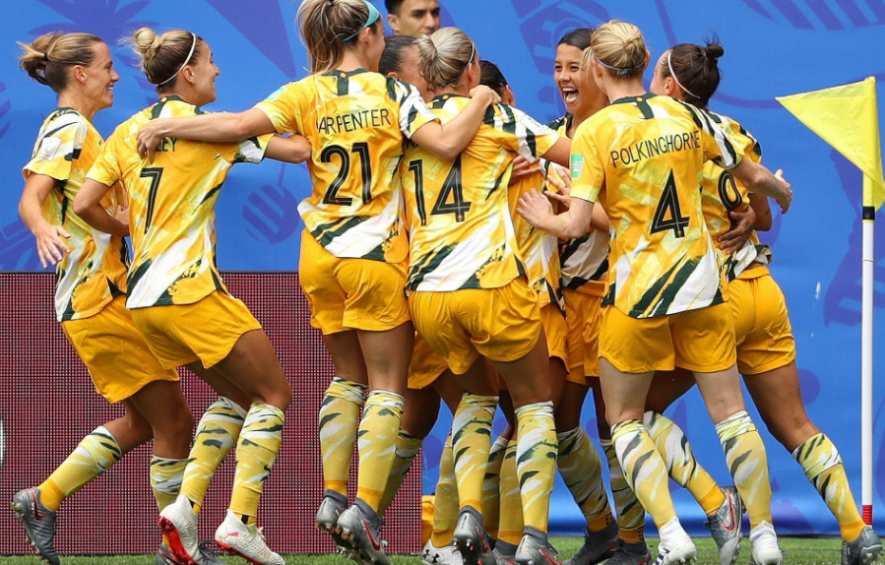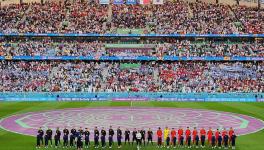Australia Introduces Equal Pay for Men and Women's National Team Footballers

A new three-tiered centralised contract system will see Australia’s premier women footballers get an increased annual salary from around $66,000 to $100,000 – the same amount as the top men.
In a landmark deal, Professional Footballers Australia and Football Federation Australia (FFA) have detailed a pay agreement that closes the pay gap between Australia’s men and women's national team players. Although the new agreement does not stipulate payments be the same for both teams, it does ask that the revenues be split equally.
Currently the men’s team receives a match payment for each appearance with the national team or for being selected for a camp over a certain length. The women, however, are under central contracts. The contract guarantees a set amount of money regardless of appearances.
The new four-year deal ensures that both teams receive a 24% share of an agreed aggregate of revenue generated by the national team in 2019-20, rising by 1% each year. More significantly though, a new three-tiered centralised contract system will see Australia’s premier women footballers provided with increased annual salary from around $66,000 to $100,000 – the same amount as the top men.
Also Read | Mahesh Bhupathi Hits Back at AITA Over Davis Cup Captaincy Drama
The Matildas — as the women team is affectionately known — will also receive the same access to off-field benefits such as business-class flights, training facilities and specialist performance support staff as the men’s team are afforded.
The allocation of any prospective World Cup prize money to players has also been increased. Under the new collective bargaining agreement, players are entitled to 40% prize money on qualifying for a Fifa World Cup, representing an increase from 30%. That share of prize money increases to 50% if they progress to the knockout stage of the competition.
FFA’s parental leave policy is also under review to provide an even higher level of support for Matildas during pregnancy and when returning to national team duty.
“This is a unique deal in world football and we believe sets the model for where all federations and players – male and female – can take the game to unlock the incredible social and commercial opportunity that, in particular, women’s football presents,” PFA chief executive John Didulica said in conversation with Australian media outlets.
Also Read | Indian Hockey Teams Enter Tokyo Olympics: Five Takeaways from the Qualifying Campaign
“The deal is based on the principles of partnership, equality and investment. The players of today are investing in the future of Australian football because they believe in the game and they believe in each other.”
Gallop also paid tribute to current men’s Australian football captain Mark Milligan, who backed the pay parity push wholeheartedly after travelling to France earlier this year for the Women’s World Cup.
“It’s been clear for everybody to see how much it [women’s football] has grown over the last few years, and especially how well our Matildas have been doing,” he said. “I’d only really heard and read about the successes they were having, and to be able to go across and witness it first-hand was extraordinary. It really drove home how important it was during these negotiations that they got what they deserved.”
In doing so, Australia become the fourth country to introduce an equal pay structure for its male and female players. They join Norway the first nation to implement equal pay way back in October 2017, the Netherlands, and Finland — who did so earlier this year — as the three countries who have made equal pay mandatory for their footballers.
Also Read | India vs Bangladesh in Delhi Smog: Indian Cricket Team and BCCI Smokescreen Pollution
Ironically, while this happens across the world, the World champions, USA, arguably the most powerful team in the world, are locked in a bitter legal feud with their federation citing payment issues as well as lower bonus, inferior travel, accommodations, training facilities and overall treatment compared to the men's squad.
The issue has reached the US Congress, which has introduced a law that would block any form of federal funding for the 2026 World Cup — which the US is co-hosting alongside Mexico and Canada — unless the women's team players are paid what would be fair and equitable wages.
Get the latest reports & analysis with people's perspective on Protests, movements & deep analytical videos, discussions of the current affairs in your Telegram app. Subscribe to NewsClick's Telegram channel & get Real-Time updates on stories, as they get published on our website.
























